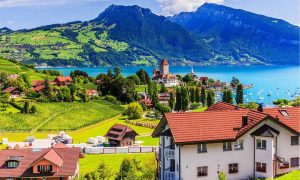In recent years, with the EuropeanimmigrantsWith its stable social system, excellent education resources and high quality of life, Switzerland is increasingly favored by middle-class and high net worth families. However, Switzerland has always been regarded as one of the "most expensive" countries in Europe, and many people are not familiar with the country.Immigration to Switzerlandof the cost of the program is prohibitive. So, the year 2025Immigration to SwitzerlandHow much does it really cost? Are there reasonable ways to save money? This article gives you a realistic and detailed budget checklist and practical advice to help you make a more informed decision.
One,Immigration to SwitzerlandSeveral common paths of
Before budgeting, learn about a few mainstreamImmigration to SwitzerlandWay:
-
Self-employed immigrants (entrepreneurial immigrants)
For applicants who wish to start a company in Switzerland and need to prove that the business is beneficial to the local economy. -
Retirement Immigration
For applicants without a work program but with a stable pension or assets, usually requiring age 55 or older. -
Residence permit + non-working mode (Lump Sum Taxation)
Aimed at high-net-worth individuals, the residence permit is granted on the basis of a negotiated fixed tax on assets, mainly in certain French-speaking regions or in the canton of Ticino. -
Employer sponsorship through work
It is more difficult to obtain for non-EU people, but there are still opportunities for technical or managerial people.
This article takes "self-employed immigrants" and "retirement immigrants" as the main lines, and sets out the detailed cost lists for mainstream applicants' reference.
II. 2025Immigration to SwitzerlandBudget list (for a family of three)
1. Basic Immigration Application Fee
| Cost items | Amount (CHF) | clarification |
|---|---|---|
| Fees for consulting and legal services | 10,000 – 20,000 | Depends on depth of service |
| Company registration (self-employment path) | 5,000 – 8,000 | Including registered capital, notarization, auditing, etc. |
| Residence Application and Permit Fees | 1,000 – 3,000 | Fees vary slightly from state to state |
| Miscellaneous fees for translation, notarization, etc. of documents | 1,000 – 2,000 | Includes notarization, double certification, translation |
Subtotal: approx. 18,000 - 33,000 CHF (approx. 140,000 - 250,000 RMB)
2. Proof of funds or assets (not actual expenses)
-
Self-employment path: some proof of start-up capital is required and generally recommendedCHF 100,000-200,000as an operating reserve.
-
Retirement path: need to prove that annual income covers living expenses, e.g. more than 80,000 Swiss francs per year (or assets in the millions).
⚠️ This is not "out-of-pocket" money, but it needs to be "on the table" as a requirement for an immigration application.
3. Initial cost of living and settling in
| Cost items | Monthly/yearly average | clarification |
|---|---|---|
| rent for a room or house | 2,500 - 4,000 per month | Slightly higher in the city center in Zurich or Geneva, for example |
| medical insurance | 300 - 500 per person per month | Compulsory purchase, priced by age |
| Cost of living (food and clothing) | 1,500 - 2,500 per month | Reasonable level of consumption for a family of three |
| International school fees (if any) | 20,000 - 35,000/person/year | Choice of public schools free of charge (German, French teaching) |
Total estimated expenditure for the first year: about 60,000 - 100,000 CHF (450,000 - 750,000 RMB)

III. The true cost range of emigrating to Switzerland in 2025
The combined measurements are as follows, based on different pathways and lifestyle differences:
-
Basic family immigration (frugal living, public education):

-
Initial cost + first year cost of living approx. 80,000 - 100,000 Swiss francs
-
Conversion to RMB approx. $600,000 to $750,000
-
-
Middle to high end immigrant families (renting in good locations, international schools):
-
Initial cost + first year cost of living approx. 150,000 - 200,000 Swiss francs
-
Renminbi (RMB) equivalent $1.1 million to $1.5 million
-
IV. Suggestions for saving money: spending well and steadily
✅ Reasonable avoidance of popular cities
Zurich and Geneva are certainly the big cities in Switzerland, but they also have the most expensive rents. ChooseBern, Basel, Lausanne, Lucerne and other second-tier citiesThe company's goal is to save money on rent and living costs without compromising on quality of life.
✅ Choice of public education system
The quality of public education in Switzerland is very high andTuition is basically zero.. If the family is comfortable with a German or French-speaking environment, enrolling the child in a public school is the most cost-effective option.
✅ Medicare chooses the "high deductible" option.
Swiss health insurance allows you to freely choose your deductible; the higher the deductible, the lower the monthly premium. Young, healthy families can chooseHigh deductible + reserve emergency medical fundThe way to save on premiums.
✅ Reasonable choice of state and residence
Swiss cantons have different tax rates and approval policies for immigrants. For exampleZug (Zug) has low taxes but high cost of livingwhereasTicinoEncourage high net worth immigration, fast approval, cheap rent, is the "cost-effective choice".
V. Conclusion: not low cost, but good value
2025Immigration to SwitzerlandIt's not a "zero barrier", but for families with some assets who value education and quality of life, this investment is a long-term income option. It's not about what you can afford to spend, it's about what you can afford.Is this money worth spending on more stability, peace of mind, and a better quality of life over the next decadeThe
Lastly, we remind you that immigration is not just a matter of settling accounts, but also involves multiple variables such as language, culture, children's education, career planning, etc. We suggest that you make a comprehensive plan before making a decision. It is recommended to make a comprehensive planning and rational judgment before making a decision, taking into account your own situation.






